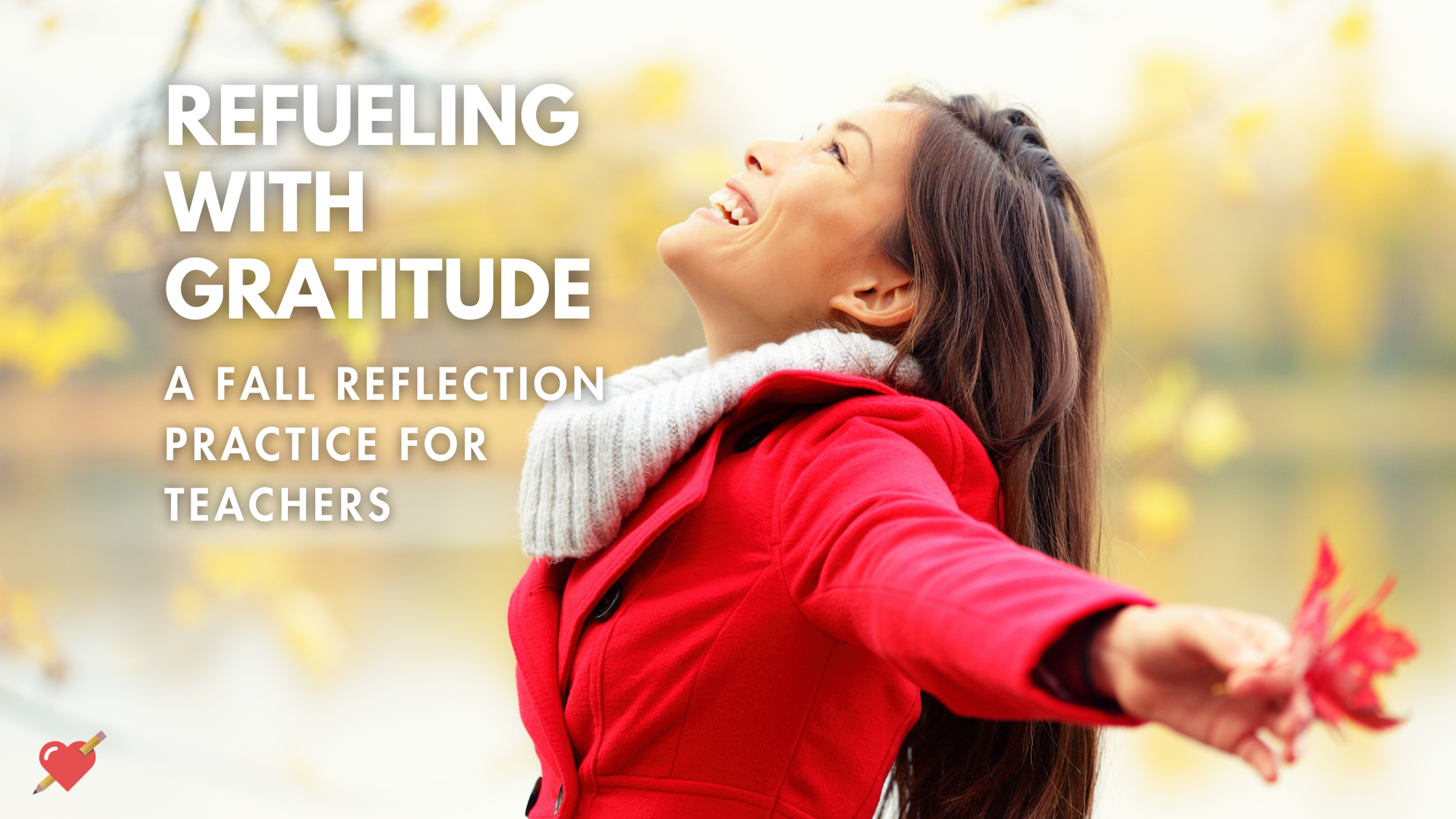Simple Fall Gratitude Practice for Teachers
Fall is the perfect time to try a gratitude practice for teachers. Explore some of our favorite gratitude and reflection activities for teachers and discover why this helps reduce stress and burnout.
As the fall season settles in, you might find yourself running on empty. On one hand, you likely have your classroom rhythm in swing, and you’ve developed solid relationships with your students. But on the other hand, the back-to-school energy has faded, and is now replaced by long days, conferences, endless grading, and a to-do list that never ends.
This busy season, gratitude can be more than a fleeting thought before we gather with friends and family for harvest festivals and Thanksgiving. Instead, gratitude can be a grounding practice, a way to refill your cup and reconnect with what lights you up.
Gratitude doesn’t mean ignoring challenges, sugarcoating burnout, or moving toward toxic positivity. Instead, cultivating a gratitude practice allows us to pause and acknowledge the micromoments that bring us joy. It’s also a way to increase positive health outcomes and take care of ourselves in the midst of difficulty. A gratitude practice for teachers can be an anchor in the swirl of daily demands.
Why Gratitude Matters for Teachers
There are many moments throughout the school year when students and families are encouraged to express their gratitude for teachers. But the most powerful gratitude practices for teachers are the ones we do ourselves. So why does practicing gratitude make such an impact?
Gratitude anchors us.
When our emotional capacity is depleted, we may begin to feel numb, “on autopilot,” or less connected to others. A moment of gratitude — noticing one positive interaction with a student, acknowledging a supportive colleague, or even finding joy in a cup of coffee — helps us reconnect with the small things in our lives that bring us joy.
Gratitude strengthens our relationships.
When we model gratitude, it shifts the tone of our day and our interaction with others. Perhaps you invite a colleague to share something they appreciated this week, or you begin your morning meeting by acknowledging one small “win” from the day before. These practices ripple outward. In a profession where so much feels invisible, that acknowledgement can be transformative.
Gratitude supports our resilience.
When I talk with fellow educators, the phrases I hear most often are “I should be doing more,” “I don’t feel valued,” or “There’s just not enough time in the day.” Gratitude isn’t a cure-all, but it helps open the door to self-reflection for techers. When we pause and notice what is working, we also begin to see possibilities — small actions, choices, and reframes.
4 Gratitude Practices You Can Begin Today
Here are some manageable gratitude practice examples to incorporate into your life this fall:
Morning check-in
Before you begin your day, name one thing you’re grateful for in your personal or professional life. Write it down in a notebook or simply say it aloud to yourself. Check out this gratitude journaling practice to extend your practice.
“Photo a day” reflection practice for teachers
Snap one photo each day of something that brings you a moment of appreciation — sunlight through a window, your pet sleeping, a finished project, a kind text. At the end of the week, scroll through the images as a visual gratitude journal.
Evening “enough” list
Instead of listing what you didn’t finish at the end of the day, write down three things that were enough about your day — enough effort, enough kindness, enough rest, enough connection.
Gratitude meditation for teachers
At any time during the day when you have a natural pause, spend time practicing gratitude with a gentle meditation script. Meditation naturally lowers stress hormones, allows you time to turn inward, and promotes self-care. It’s also a great way to easily incorporate reflection into your teaching practice.
Gratitude doesn’t erase the exhaustion you feel as a teacher, but it can infuse your life, within and beyond the classroom, with perspective. So before the rush of winter begins, take time to refuel — not with more tasks or new goals, but with appreciation for the good that’s already here.
Get More Support In Your Career Journey
Whether you decide to continue to drive change in the classroom or realize that you’re ready to explore alternative jobs for teachers beyond the classroom, the Educator Forever community is here to support you along the way!
Join the Educator Forever Network, where you’ll find step-by-step career guidance, live group calls, and exclusive access to wellness, creativity, and co-working sessions to support your growth.
Plus, our private jobs board connects you to exciting new flexible job leads daily. You’ll also have an incredible community of like-minded educators cheering you on as you expand your impact and income beyond the classroom.
References:
About The Author
April Brown (M.Ed.) is Educator Forever’s Director of Learning and Development. In 2015, April began designing curriculum and writing articles for an EdTech company as a side gig while she was teaching in Placencia, Belize. After having her eldest daughter in 2016, April was eager to use her unique experience teaching and leading in mainstream and alternative settings in the United States and internationally to work remotely while still making a difference in education.
The Educator Forever Network empowered April to leverage her skills as a compassionate disruptor and out-of-the-box thinker to excel as an instructional/well-being coach, adjunct instructor of Trauma Supportive Schools and Mindfulness courses, curriculum developer, and writer for publications such as PBS SoCal, Education.com, and Britannica for Parents. April resides in Southern Vermont with her daughters and husband and is the Director of Learning Support at a small progressive independent school serving preschool through eighth grade. She is an advocate for teachers and students – inside and outside of the classroom.


